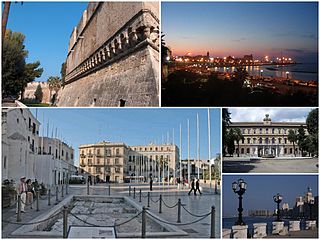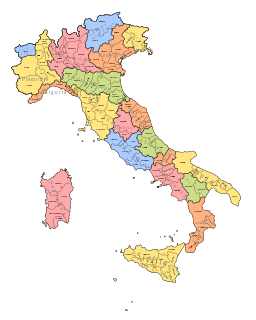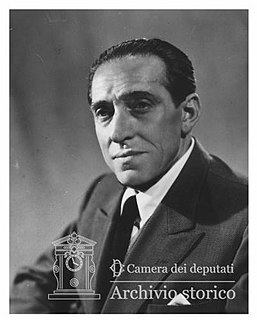
Bari is the capital city of the Metropolitan City of Bari and of the Apulia region, on the Adriatic Sea, southern Italy. It is the second most important economic centre of mainland Southern Italy after Naples. It has a port and university city, as well as the city of Saint Nicholas. The city itself has a population of 320,257 inhabitants, over 116 square kilometres (45 sq mi), while the urban area has 750,000 inhabitants. The metropolitan area has 1.3 million inhabitants.

Saint Nicholas of Myra, also known as Nicholas of Bari, was an early Christian bishop of Greek descent from the maritime city of Myra in Asia Minor during the time of the Roman Empire. Because of the many miracles attributed to his intercession, he is also known as Nicholas the Wonderworker. Saint Nicholas is the patron saint of sailors, merchants, archers, repentant thieves, children, brewers, pawnbrokers, unmarried people, and students in various cities and countries around Europe. His reputation evolved among the pious, as was common for early Christian saints, and his legendary habit of secret gift-giving gave rise to the traditional model of Santa Claus through Sinterklaas.
Stephanus or Stephan of Byzantium, was a Byzantine grammarian and the author of an important geographical dictionary entitled Ethnica (Ἐθνικά). Only meagre fragments of the dictionary survive, but we possess an epitome compiled by one Hermolaus, not otherwise identified.
Pope John XIX, born Romanus, was bishop of Rome and ruler of the Papal States from 1024 to his death. He belonged to the family of the powerful counts of Tusculum, succeeding his brother, Benedict VIII. Papal relations with the Patriarchate of Constantinople soured during John XIX's pontificate. He was a supporter of Emperor Conrad II and patron of the musician Guido of Arezzo.

The provinces of Italy are the constituent entities of the Italian Republic, on an intermediate level between a municipality and a region. Since 2015, provinces have been classified as ‘institutional bodies of second level’.

Società Sportiva Calcio Bari, commonly referred to as Bari, is an Italian football club founded in 1908 and based in Bari, Apulia. It currently plays in Serie C.

Nicola Di Bari, born Michele Scommegna on 29 September 1940, is an Italian singer-songwriter and actor. He is considered one of the "sacred monsters" of Italian pop music.

Salimbene di Adam, O.F.M., was an Italian Franciscan friar, theologian, and chronicler who is a source for Italian history of the 13th century.

John and Paul are saints who lived during the fourth century in the Roman Empire. They were martyred at Rome on 26 June. The year of their martyrdom is uncertain according to their Acts; it occurred under Julian the Apostate (361–3).

The Roman Catholic Archdiocese of Otranto is a see of the Catholic Church in Italy. The seat of the diocese is at Otranto Cathedral in the city of Otranto, Apulia. It is a suffragan of the archdiocese of Lecce.
Christopher or Christophoros Burgaris was the short-tenured successor of the famous Basil Boiannes as catepan of Italy.
Antonio di Gennaro is an Italian former footballer who played as a midfielder.

Gian Piero Ventura is an Italian football manager.
The Emirate of Bari was a short-lived Islamic state in Apulia ruled by non-Arabs, probably Berbers and Black Africans. Controlled from the South Italian city of Bari, it was established about 847 when the region was taken from the Byzantine empire, but fell in 871 to the army of Emperor Louis II.

The Roman Catholic Archdiocese of Bari-Bitonto is Metropolitan Latin rite archbishopric in the administrative Bari province, Puglia (Apulia) region, southeastern Italy, created in 1986, when the historical diocese of Bitonto was subsumed in the Archdiocese of Bari.
Tabae or Tabai was a city in ancient Caria, although, according to Strabo it was located in a plain in Phrygia on the boundaries of Caria. The place is now Tavas, near Kale, Denizli in Turkey; some inscriptions and numerous ancient remains have been found.

The Metropolitan City of Bari is a metropolitan city in the Apulia region of Italy. Its capital is the city of Bari. It replaced the Province of Bari and includes the city of Bari and some forty other municipalities (comuni). It was first created by the reform of local authorities and then established by the Law 56/2014. It has been operative since January 1, 2015.
Baris, called Baris in Hellesponto to distinguish it from other places called Baris, was an ancient city and bishopric in Asia Minor, which remains a Catholic titular see.
Bisantius, also spelled Byzantius, Byzantios, Bisanctus, Vyzantios or Visantius, was a masculine given name of Greek origin.

Araldo di Crollalanza (1892–1986) was an Italian journalist and politician who held significant posts in Fascist Italy. He was the minister of public works between 1930 and 1935 and a long-term member of the Italian Senate.












